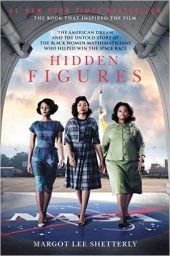Hidden Figures: The Story of the African-American Women Who Helped Win the Space Race

Hidden Figures: The Story of the African-American Women Who Helped Win the Space Race - Margot Lee Shetterly
Non-Fiction
Pages: 416
Before the movie Hidden Figures was released I had never heard of Kathryn Johnson, Dorothy Vaughan or Mary Jackson. And, as Margot Lee Shetterly comments she heard so often during the course of writing this book, I did indeed find myself asking, 'Why haven't I heard this story before?'
But of course I know why. Because they were women, because they weren't white, because the story of Western science and engineering and technology has always been one dominated by men. I haven't heard of these remarkable women in the same way that many people have never heard of Rosalind Franklin but they've heard of DNA; they've never heard of Vera Rubin but they've heard of dark matter. Women scientists were involved in creating the computer, discovering pulsars, developing the atom bomb, understanding bacteriology - but you'd never know it from the textbooks, and it's the men who took home the Nobel Prizes.
So just imagine how much more unlikely an achievement it was to work at NACA and later NASA in Virginia during the height of segregation: when, as the author points out, a woman like Kathryn Johnson was more likely to die before her thirty-fifth birthday than graduate high school. And yet these women did graduate high school, they went on to college and graduate school, they became mathematicians and worked at the highest levels of the space programme, computing and calculating the numbers necessary to send men into space and to the moon. But prior to reading this book I wouldn't have even known there were any women in the space programme, let alone these African-American women working there all the way back in the 1940s.
I'd give this book five stars for just bringing the story to light, let alone for its own merits. And yet it's a fantastic read, lively, engaging, never once flagging or failing. Despite discussing the lives of women who dealt in complex mathematics, with terminology and concepts I can't even begin to comprehend, the narrative never once gets bogged down in scifi-esque technobabble. She manages to make the exceptionally complex understandable and even readable, and that's no mean feat. And that's quite apart from tying these women's lives into the broad sweep of American history, the Civil Rights movement, the Cold War, the Space Race. It's a must-read, and the movie (which admittedly takes a fair few liberties, as all movies do) is a must-see.